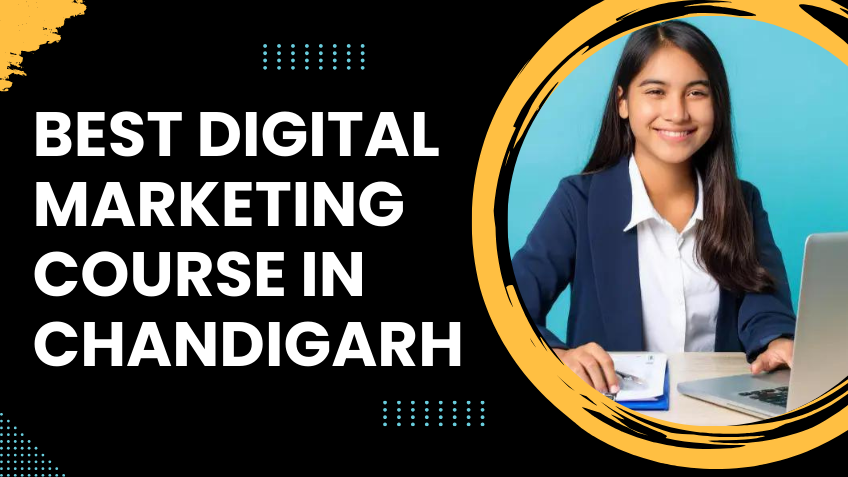Best Digital Marketing Course in Chandigarh
In today’s digital age, mastering best digital marketing course in chandigarh has become necessary for anyone looking to flourish in the online business landscape. With businesses increasingly relying on digital channels to reach their target audiences, having a robust understanding of digital marketing can open doors to numerous career opportunities.
If you’re in Chandigarh and seeking to improve your digital marketing skills, this guide will help you find the most excellent digital marketing course in Chandigarh.
The Benefits of Taking a Digital Marketing Course
Successful online marketing is necessary for businesses to reach and slot in their target audiences in the digital age. A marketing course gives you the skills and knowledge needed to excel in this dynamic field.
Here’s a closer look at the critical areas enclosed in such a course and how they can help you build a successful career in digital marketing.
1. Search Engine Optimization (SEO)
What is SEO?
Search Engine Optimization (SEO) improves a website’s visibility on search engines like Google. When users search for your business information, SEO helps ensure your website appears highly in search results.
Why is SEO Important?
- Increased Visibility: Higher rankings in search results lead to more visibility for your website.
- Organic Traffic: SEO drives more organic (non-paid) traffic to your site, which can lead to conversion and higher appointments.
- Trust and Credibility: Users often trust search engines to provide applicable, high-quality results. A well-optimized site can improve your honesty and reliability.
What You Learn:
- Keyword Research: Identifying the correct phrases and keywords that potential customers are searching for.
- On-Page SEO: Optimizing individual web pages to rank higher, including improving headings, content, and meta tags.
- Off-Page SEO: Improving and Building backlinks to your site’s authority through external signals.
- Technical SEO: Ensuring your website’s technical aspects, such as site mobile-friendliness and speed, are optimized for search engines.
2. Pay-Per-Click Advertising (PPC)
What is PPC? Pay-per-click (PPC) advertising involves placing ads on search engines and other platforms, where you pay each time someone clicks on your ad. It’s a way to make targeted traffic to your website quickly.
Why is PPC Important?
- Immediate Results: PPC campaigns can generate leads and traffic almost right away.
- Targeted Advertising: You can target specific interests, demographics, and locations.
- Budget Control: You have complete control over your publicity budget and can adjust it based on performance.
What You Learn:
- Campaign Setup: Managing and Creating PPC campaigns on platforms like Bing Ads and Google Ads.
- Keyword Bidding: Bidding and Selecting the right keywords to ensure your ads appear to the right audience.
- Ad Copywriting: Crafting compelling ad copy that encourages users to click.
- Performance Analysis: Monitoring and Analyzing ad performance to optimize campaigns and get better ROI.
3. Social Media Marketing
Social Media Marketing involves using social media platforms like Instagram, Twitter, Facebook, and LinkedIn to promote your brand, connect with your audience, and force traffic to your website.
Why is Social Media Marketing Important?
- Brand Awareness: Social media helps increase brand reach and visibility to a broader audience.
- Customer Engagement: connect directly with customers, answer their questions, and build relationships.
- Traffic and Conversions: Drive traffic to your website and increase conversions through targeted social media campaigns.
What You Learn:
- Platform strategy: Understanding each social media platform’s features and best practices.
- Content Creation: Sharing and Developing attractive content that resonates with your audience.
- Advertising: Running targeted ad campaigns on social media platforms to reach specific audiences.
- Analytics: Measuring the effectiveness of your making data-motivated decisions and social media efforts.
4. Content Marketing
Content Marketing involves creating and distributing valuable, relevant, and reliable content to connect and attract a target audience. The goal is to force beneficial customer action by providing helpful information.
Why is Content Marketing Important?
- Audience Engagement: High-quality content can keep and attract your audience’s attention.
- Brand Authority: Providing valuable content helps start your brand as an ability in your industry.
- Lead Generation: Successful content can drive traffic to your conversion and website visitors into leads.
What You Learn:
- Content Strategy: Develop a content plan that aligns with your business audience’s needs and goals.
- Content Creation: Crafting different types of content, including articles, videos, blog posts, and infographics.
- Content Distribution: Using different channels to promote and distribute your content.
- Performance Tracking: Analyzing content performance and making adjustments to recover results.
5. Email Marketing
What is Email Marketing? Email Marketing involves sending targeted messages to your audience to promote products, share news, or build relationships. It’s a cost-effective way to reach and connect with your audience.
Why is Email Marketing Important?
- Direct Communication: Reach your audience directly in their inbox.
- Personalization: Tailor your messages to individual preferences and behaviours.
- High ROI: Email marketing often provides a high return on investment due to its targeted nature.
What You Learn:
- Email Campaign Design: Creating effective email campaigns that capture notice and drive action.
- List Building: Growing and managing your email subscriber list.
- Segmentation: Segmenting your audience to convey personalized and relevant content.
- Analytics: Measure the success of your email campaigns and optimize for better results.
6. Analytics
What is Analytics? Analytics involves measuring and analyzing data from your digital marketing efforts to understand what’s working and what isn’t. It helps you make informed decisions to recover your strategy.
Why is Analytics Important?
- Performance Measurement: Track the effectiveness of your channels and marketing campaigns.
- Data-Driven Decisions: Use data to make informed, optimized decisions about your strategy.
- ROI Calculation: Determine the return on investment for your marketing actions.
What You Learn:
- Google Analytics: Setting up and using Google Analytics to track user behaviour and website traffic.
- Data Interpretation: Analyzing data to identify patterns, trends, and insights.
- Reporting: Creating reports to communicate your recommendations and findings.
- Optimization: Using data to improve marketing performance and adjustments.
Read More 📖: SEO course for beginners
How to Choose the Best Digital Marketing Course
Selecting the right courses for digital marketing can be vital for your career growth. With many options available, making an informed choice that aligns with your needs and goals is essential.
Here’s a complete guide on what to look for when choosing a best digital marketing course:
1. Curriculum
What to Consider: The curriculum is the core of any educational program. Ensure that the digital marketing course covers all the critical areas of digital marketing. A well-rounded curriculum should include:
- Search Engine Optimization (SEO): Learn how to improve website visibility and rank higher in search engine results.
- Pay-Per-Click Advertising (PPC): Understand how to create ID ad campaigns and manage them successfully.
- Social Media Marketing: Explore strategy to control social media platforms for engagement and brand promotion.
- Content Marketing: Study how to create valuable content that keeps and attracts your target audience.
- Email Marketing: find out techniques for managing and building successful email campaigns.
- Analytics: Gain skills in measuring digital marketing performance to make data-driven decisions.
Why It Matters
A complete curriculum ensures you acquire broad skills for a successful digital marketing career. It prepares you to handle different features of adjusting and digital marketing to other job roles in the industry.
2. Faculty
What to Look For: The expertise of the instructors can influence your learning experience. Check if the course is taught by:
- Experienced Professionals: Instructors with hands-on experience in digital marketing bring practical knowledge and real-world insight.
- Industry Experts: Look for faculty members who have worked on high-profile projects or with honest companies.
Why It Matters
Experienced faculty members can provide shared industry best value practices guidance and offer insights and valuable advice beyond textbook knowledge. Their practical experience can help you understand how to apply concepts in real-world scenarios.
3. Certification
What to Verify: Certification adds value to your resume and validates your skills to potential employers. Ensure that the course offers:
- Recognized Certification: Check if the certification is well-regarded in the industry and accepted by employers.
- Accreditation: Look for courses accredited by professional educational or organization bodies.
Why It Matters
A recognized certification enhances your credibility and can significantly improve your career prospects. It serves as details of your commitment and expertise to the field.
4. Practical Training
What to Look For: Practical training is vital for applying theoretical gaining knowledge and hands-on experience. Make sure that the course includes:
- Hands-On Projects: Opportunities to work on real-world projects or case studies that mimic industry challenges.
- Live Campaigns: Experience managing live digital marketing campaigns to understand the shade of campaign execution.
- Internships: Options for internships or collaborations with companies to gain industry experience.

Why It Matters:
Practical training helps you apply what you’ve learned in a real-world context, making you more job-ready. It allows you to develop skills that are directly transferable to future job roles.
5. Reputation and Reviews
What to Check: Research the reputation of the institution offering the course. Look for:
- Student Reviews: Read feedback from past students to gauge their satisfaction with the course and the quality of instruction.
- Institutional Reputation: Investigate the overall reputation of the institution or training centre. Reputable digital marketing institute are likely to provide high-quality education.
Why It Matters
Good reviews & a positive reputation can indicate an effective and reliable course. Choosing a well-regarded institution ensures you receive support and quality education throughout your learning journey.
Conclusion
Choosing the right digital marketing course in Chandigarh is crucial for your career growth in today’s digital landscape. A well-rounded course should cover essential areas like PPC, email marketing, social media marketing, SEO, content marketing, and analytics. Look for programs with experienced faculty, practical training, recognized certification, and positive reviews. By selecting a course that meets these criteria, you’ll gain valuable knowledge and skills to excel in digital marketing and enhance your career prospects.

